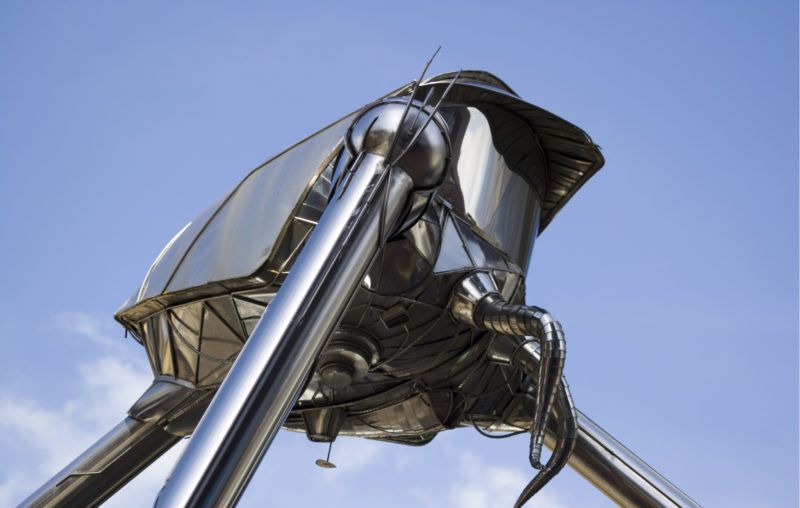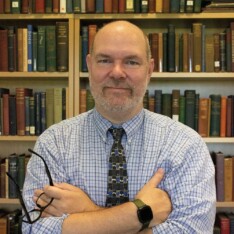HG Wells on the Partnership Between Viruses and Humans

The tension between man and nature is always, everywhere, taut. It is particularly easy to forget that, particularly in urban environs — given the preponderance of concrete, steel, and glass amid commerce and social engagement. But even in midtown Manhattan, one of the most heavily trod places on earth: isolate a small area of pavement for a few days and sprigs soon appear from the edges. In just a few months, frail plants with leaves thinner than paper have wrest modernity back to the primordial: splitting asphalt, invading neighboring areas, and inexorably pushing toward the sky.
The outbreak of the novel coronavirus pandemic has come so differently than most other collisions between human beings and the natural world — natural disasters and extreme weather, usually — that it seems to have leapt to an existential status.
At AIER we have written at length about historical analogues to the pandemic, about the need to maintain our humanity. Not so much the need as the requirement to not sacrifice the things that make us human — commerce, social interaction, creative association — in the wake of a new microbe.
HG Wells’ “War of the Worlds” (1898) carries a bevy of allegories, from colonialism and militarism to primitivism, Social Darwinism, and war. The nameless narrator (“Narrator”) survives the onslaught of a brutal Martian invasion. Amid the invasion, as he makes his way from Woking, England to London, he finds that many of his formerly rational countrymen have descended into bizarre behaviors and views. With citizens creeping around to avoid detection, a clergyman begins bellowing about the Apocalypse, leading to his death. Another suggests abandoning the surface of earth to restart civilization in subterranean caverns. Hysteria leads to the demise of untold numbers of people.
Just as all hope is lost, a strange wailing sound erupts for a time and then stops; with that, the motion of the Martian tripods and other machines stop. The Narrator makes his way to one of the invader’s bases:
Great mounds had been heaped about the crest of the hill, making a huge redoubt of it—it was the final and largest place the Martians had made—and from behind these heaps there rose a thin smoke against the sky. Against the sky line an eager dog ran and disappeared. The thought that had flashed into my mind grew real, grew credible. I felt no fear, only a wild, trembling exultation, as I ran up the hill towards the motionless monster. Out of the hood hung lank shreds of brown, at which the hungry birds pecked and tore. In another moment I had scrambled up the earthen rampart and stood upon its crest, and the interior of the redoubt was below me. A mighty space it was, with gigantic machines here and there within it, huge mounds of material and strange shelter places.
In it, the war machines lie ruined, the invaders dead or close to death: the wailing sounds that drew the Narrator there were the death cries of the Martians.
And scattered about it, some in their overturned war-machines, some in the now rigid handling-machines, and a dozen of them stark and silent and laid in a row, were the Martians—dead!—slain by the putrefactive and disease bacteria against which their systems were unprepared; slain as the red weed was being slain; slain, after all man’s devices had failed, by the humblest things that God, in his wisdom, has put upon this earth.
Wells brings us the denouement. Despite the massive destructive power of conventional armaments (and in later adaptations, even nuclear weapons), the invaders are ultimately bested by a most unexpected partner of mankind:
For so it had come about, as indeed I and many men might have foreseen had not terror and disaster blinded our minds. These germs of disease have taken toll of humanity since the beginning of things—taken toll of our prehuman ancestors since life began here. But by virtue of this natural selection of our kind we have developed resisting power; to no germs do we succumb without a struggle, and to many—those that cause putrefaction in dead matter, for instance—our living frames are altogether immune. But there are no bacteria in Mars, and directly these invaders arrived, directly they drank and fed, our microscopic allies began to work their overthrow. Already when I watched them they were irrevocably doomed, dying and rotting even as they went to and fro. It was inevitable. By the toll of a billion deaths man has bought his birthright of the earth, and it is his against all comers; it would still be his were the Martians ten times as mighty as they are. For neither do men live nor die in vain.
At the time that Wells’ War of the Worlds was published in book form (1898), bacteria had been identified for over 200 years, discovered by the “Father of Microbiology,” Dutch scientist Antoni van Leeuwenhoek. But the same year as the book was published, Loeffler and Frosch ascertained that foot-and-mouth disease was filterable, and thus essentially discovered the first virus. Within the next ten years the yellow fever, rabies, variola, polio, and chicken leukemia virii were also discovered. That, of course, doesn’t change the book’s resolution: Wells, probably more than any other writer at that time, would have readily conceded that the cosmos, including the world of microscopic pathogens, teems with the unknown.
Primitivism, the late nineteenth/early twentieth century literary theme closely associated with Jack London, is at work here. A primary theme within the primitivist genre is that in the natural order of things, the survival of the fittest becomes the ordering principle. But it is not only that this struggle take place in nature, “red in tooth and claw.” Man has not only learned to build and reason, but our bodies have quietly engineered the means —at the cost of nameless multitudes over many millennia — to fight, or come to uneasy partnerships with, the unseen.
Yet antibodies are, in and of themselves, not enough. Part of human evolution manifests in our wisdom to choose at times and places to wear protective equipment, stay home when sick, and to take into account the vulnerability of others — older people, and those with conditions which compromise their health. This is not a call for needless self-sacrifice or the utter disregard for the more vulnerable among us.
But as science tries desperately to catch up with fear and coercion, it is critical to remember that liberty only becomes meaningful in the context of our lives on this earth. Our lives are ours, and our place earned. Let not the billions before us, who battled nature not only with their hands and minds but their immune systems, genetic variations, and other evolutionary adaptations, have lived in vain.
Man’s birthright comes in the form of our ability to learn and innovate, adapting to our surroundings and negotiating truces — always temporary — with the natural world. We must not squander our birthright.










